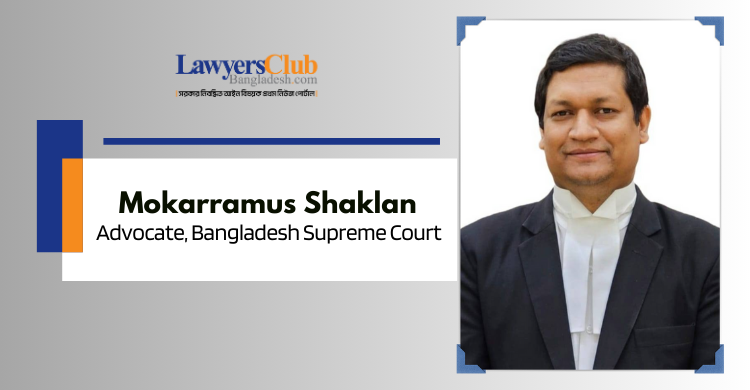Between Charge and Command: The Constitutional Crossfire of Section 20C

Mokarramus Shaklan :The insertion of Section 20C into the International Crimes (Tribunal) Act, 1973 is not just a statutory amendment it is a constitutional tremor. It unsettles the subtle balance between moral authority and procedural justice, between the sanctity of the Republic and the rights of those who serve it.
By its declared intent, Section 20C seeks to preserve institutional purity. It provides that once a person is formally charged before the Tribunal, he or she shall be disqualified from holding or being appointed to various public offices. Yet, beneath this moral armor lies a complex constitutional dilemma: when the accused wears the uniform of the Bangladesh Armed Forces, where does charge end and where does command begin?
The Language of Disqualification and Its Silences
Section 20C(1) states that upon submission of a formal charge, the accused “shall be disqualified” from(a) being elected, or being, a Member of Parliament;(b) being elected or being appointed, or being, a member or administrator of any local government body;(c) being appointed to any service of the Republic; and(d) holding any other public office.
Here, the text itself tells two different stories. Clauses (a) and (b) speak expansively, covering both those seeking office and those already holding it. Clause (c), however, confines itself to being appointed stopping short of saying being in service.
That omission is not an oversight. It is a legislative silence that carries meaning. The drafters could have written “being in the service of the Republic,” but they did not. This linguistic restraint suggests that the clause only restricts future appointments, not the continuation of existing service. Thus, for serving members of the Armed Forces, Section 20C may close the door to promotion or new appointment but it does not automatically remove them from their post.
The Armed Forces and the Chain of Command
The Armed Forces are not a mere organ of government; they are an institution of the Republic a disciplined embodiment of sovereignty under Article 61 of the Constitution. The President, as the Supreme Commander, holds ultimate authority, while internal regulations and the Defense Services Rules govern matters of discipline, suspension, and removal. To say that the Armed Forces operate “in respect of the Government of Bangladesh” is legally correct, but constitutionally incomplete. Their loyalty is not to a changing government but to the continuity of the Republic.
If Section 20C were to automatically disqualify a serving officer upon mere charge, it would amount to a civil intrusion into a command structure defined by military law and constitutional hierarchy. Such disqualification, without reference to the President or the competent authority, would distort the delicate symmetry between civilian oversight and military discipline introducing a legislative short-circuit in the constitutional circuit of command.
Morality, Justice, and the Presumption of Innocence
The moral intention of Section 20C is beyond dispute: to ensure that individuals accused of grave international crimes do not occupy offices that symbolize the moral authority of the State. Yet morality cannot eclipse due process.
Automatic disqualification upon charge reverses the constitutional presumption of innocence. It treats accusation as verdict and suspicion as guilt. Justice, however, is not a reflex of indignation; it is a discipline of fairness. The Constitution guarantees equality before law and protection of lawful occupation rights that can only be curtailed through due process, not legislative presumption.
Article 47(3) and Constitutional Scrutiny
Article 47(3) of the Constitution shields the International Crimes (Tribunal) Act, 1973 from constitutional challenge, but only insofar as its provisions relate to detention, prosecution, or punishment of international crimes. Section 20C does none of these. It imposes a civil disability, not a criminal sanction.
Therefore, it remains within the scope of judicial review. It must pass the tests of reasonableness, fairness, and proportionality. If an officer is stripped of his post by mere operation of this law without inquiry, hearing, or conviction the provision becomes a sword unsheathed in the dark, cutting before it sees.
The Moral Drift of Transitional Justice
The International Crimes (Tribunal) Act, 1973 was conceived as an instrument of historical justice, born from the moral aftermath of 1971. Its purpose was to address the unfinished business of liberation not to regulate contemporary public administration. By introducing Section 20C, the interim government has extended a law of memory into a law of management. The result is a moral drift: a statute designed to confront history is now deployed to discipline the present. When a law of justice becomes a tool of exclusion, its virtue risks turning into its vice.
The Crossfire of Charge and Command
Section 20C thus stands at a constitutional crossroads a crossfire between charge and command, between moral purpose and procedural restraint. If applied too broadly, it pierces the uniform of command with the spear of suspicion; if read too narrowly, it dulls the Republic’s moral edge. The challenge lies in balancing these imperatives so that discipline does not devour justice, and justice does not paralyze command.
The Final Commanding Officer
Ultimately, Section 20C mirrors the Republic’s own struggle between the moral authority of the State and the procedural justice of the Constitution. Its intent is noble: to preserve the sanctity of public office. Yet clothed in ambiguous language and stretched across sensitive command structures, it risks unsettling the very order it seeks to defend. The Armed Forces stand as a symbol of discipline, hierarchy, and national dignity. To subject their service conditions to a provision that speaks in half-tones is to invite constitutional uncertainty into the field of command.
Unless Parliament clarifies the scope of Section 20C, or the judiciary delineates its limits, the provision will continue to echo in the corridors of power where law marches under the banner of morality, and the Constitution must remain the final commanding officer.
Written By Mokarramus Shaklan, Advocate, Supreme Court of Bangladesh.

